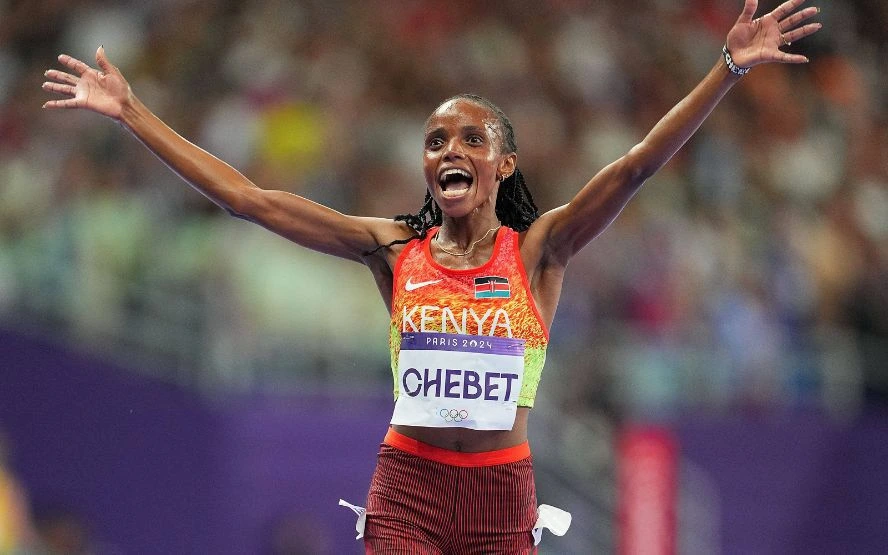Beatrice Chebet’s World Championships participation and training concerns stand at the intersection of elite ambition and the everyday realities facing Kenyan athletes. The reigning Olympics 5,000m and 10,000m champion is not only preparing to defend her global status in Tokyo but is also voicing the urgent need for improved training infrastructure—an issue as vital as her competitive targets.
Chebet’s golden double mission in Tokyo
The world stood in awe as Beatrice Chebet scripted a masterclass at the Paris 2024 Olympics, clinching gold in both the 10,000m and 5,000m. With the memory of that extraordinary double still fresh, attention now pivots to the 2025 World Championships in Tokyo. The question that reverberates in Kenyan athletic circles and beyond is whether Chebet will shoot for another historical double.
Chebet has answered unequivocally: she will. In an interview with Telecomasia.net, she confessed, “Yes, I am planning to do the double. I tried it at the Olympics for the first time and I won even though I struggled a bit and it was difficult to recover well for the second event.” She continued with honest self-reflection, “I was also a bit scared. But now, I feel I am a bit stronger and more experienced and the confidence is high. I will go there and do my best and the target is to bring a medal home in both events.”
As the world record holder in both the 5,000m and 10,000m, Chebet’s hunger for gold is stoked by a sense of destiny. Though she already owns World Championships silver and bronze in the 5,000m, it is the elusive gold that will truly complete her collection and satisfy the relentless drive she shares with so many of Kenya’s distance runners.
The mounting pressure and formidable rivals
For all her poise, Chebet knows the road will not be easy. Chasing a double at a World Championships against the likes of Faith Kipyegon, Ethiopian Gudaf Tsegay, and Dutch phenomenon Sifan Hassan, is no mere showcase. She faces a perfect storm of seasoned champions and emerging talents, each hungry for glory.
Mention of Kipyegon, herself a legend with more than one world record to her name, adds extra poignancy. Together, Kenya’s women’s team in the 5,000m, including Chebet, Kipyegon, Agnes Ng’etich, and Margaret Akidor, aim to pull off the almost unimaginable—an historic podium sweep in Tokyo. The sense of camaraderie, shared pride, and heightened pressure fuels both anxiety and inspiration for Chebet as she aims to repeat her Paris heroics.
Remaining unbeaten and breaking barriers
Chebet is arguably in the form of her life. Remaining unbeaten throughout the season, she shattered the 5,000m world record at the Prefontaine Classic, stopping the clock at a stunning 13:58.06. When asked about the possibility of her record being swiftly broken, Chebet responded with admirable perspective—her joy in the accomplishment itself overrides the anxiety of losing her place in history.
Such a mindset is emblematic of the **resilience and maturity** that only years at the cutting edge can foster. Yet, this personal resolve is constantly tested, and not only by competitors on the world circuit.
Training struggles in the spectrum of Kenyan athletics
Behind every record-shattering run lies a reality too often invisible: the daily grind in less-than-ideal conditions. Chebet and Kipyegon, two of Kenya’s brightest stars, have been unflinching in highlighting inadequate training facilities. Returning from their heroics at the Prefontaine Classic, they used their profile to urge the government to action.
“We endure a lot in training, and as Kipyegon experienced, the facilities aren’t always up to standard. We are not asking for much, just adequate training facilities,” said Chebet, summarizing the collective frustration of Kenya’s champions.
While Chebet prepares in Iten, a town renowned for its high-altitude benefits, even these surroundings can’t compensate for worn tracks or closed stadiums. The closure of Kipchoge Keino Stadium when Kipyegon needed it most is symbolic of broader, systemic concerns. Both women agree: improved facilities would not only serve today’s elite but also inspire and nurture the next generation of Kenyan runners.
| CASINO | BONUS | INFO | RATING | |
|---|---|---|---|---|
|
bonus
First Bonus: 200% Deposit Bonus
See 3 Bonuses
|
info
8048/JAZ2024-001 HunnyPlay is licensed under Curaçao (365/JAZ). Join now and win crypto instantly! |
|||
|
bonus
Refer friends, win cash prizes!
|
info
BK 0000672 PG 0000412 Mobile-friendly |
|||
|
bonus
Welcome Bonus up to 18,000KES
See 17 Bonuses
|
info
Curacao OGL/2024/225/0601 Lots of exciting bonus features |
|||
|
bonus
WELCOME BONUS UP TO 19000 KES FOR SPORTS BETTING
See 11 Bonuses
|
info
PG 0000423 A simple way to start playing |
Government response, investment, and hope
Sports Cabinet Secretary Salim Mvurya, sensitive to the chorus of champions, has outlined efforts to renovate and upgrade venues across the country. High-altitude facilities like Kamariny, Kipchoge Keino, and Kapsabet Stadiums are slated for new tartan tracks. Training conditions at Homabay, Raila Odinga, and Nyayo National Stadiums in Nairobi are also on the improvement agenda.
The government’s support, extending to revamped Olympic and Paralympic reward packages and significant financial recognition—including a Sh70 million reward for previously unrewarded athletes and Sh5 million apiece for Chebet and Kipyegon’s world records—offers reason for cautious optimism. Yet, as Chebet and her compatriots have demonstrated with their honest advocacy, true transformation is a marathon, not a sprint.
Behind medals and records, the human story
Beatrice Chebet’s determination to attempt the double at the World Championships in Tokyo is more than a personal quest. It is a statement of ambition forged on hard roads and basic tracks, a rallying cry for better conditions, and a testament to the competitive spirit that has seen Kenyan women rise to rule the world of distance running.
Chebet, Kipyegon, and their peers run not only for medals, but for dignity, opportunity, and the dream of a future where every athlete has the resources to reach their best. As the stadium lights in Tokyo await the next historic showdown, the real battle may well be taking place on the red earth tracks of Iten and the hearts of Kenya’s sporting revolutionaries.










